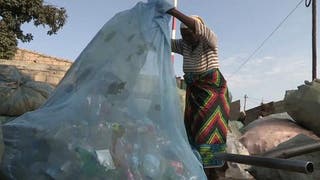Last updated on September 11th, 2021 at 08:22 am
For many Mozambicans, the Hulene dump, in Maputo, is a rescue resource to which they desperately resort in order to survive and support their families.
It is the largest dump in the country and has become the basis for a plastic collection business dominated mainly by young people and women.
Those who come here have all known hunger and deprivation. One of them is Madalena Júlio, who has a disabled father and an unemployed mother.
“I started picking up plastics at the age of 13 because my mother had no money to pay for school,” Madalena Júlio, now 16, explained.
“I picked up the trash to sell and buy notebooks.” “I went to the dump in 2000”, Lisete Boavida, 57, said.
I was having a difficult time at house, with children.” “So I started to go to the dump.
My life started to move forward, until today.”
The collectors survive by selling their findings to recycling companies which operate right next to the dump, such as Valor Plástico, a Maputo-based company that works with 800 registered collectors.
“Basically we acquire and collect plastic from other industries, from the collectors who are on the streets and in the dumps,” Luís Stramota, the CEO of Valor Plástico, said.
“The plastic is collected, selected by type.
Then there is the transformation process, of recycling itself, which has to do with grinding the plastic, washing it and turning it back into a raw material that can be used.
” From Valor Plástico, where the plastic is smashed, the raw material goes to Topack, one of the few companies in Mozambique dedicated to transform the environment’s number 1 enemy into new products.
The plastic collectors are critical to the value chain based in the circular economy.
(AFP)

